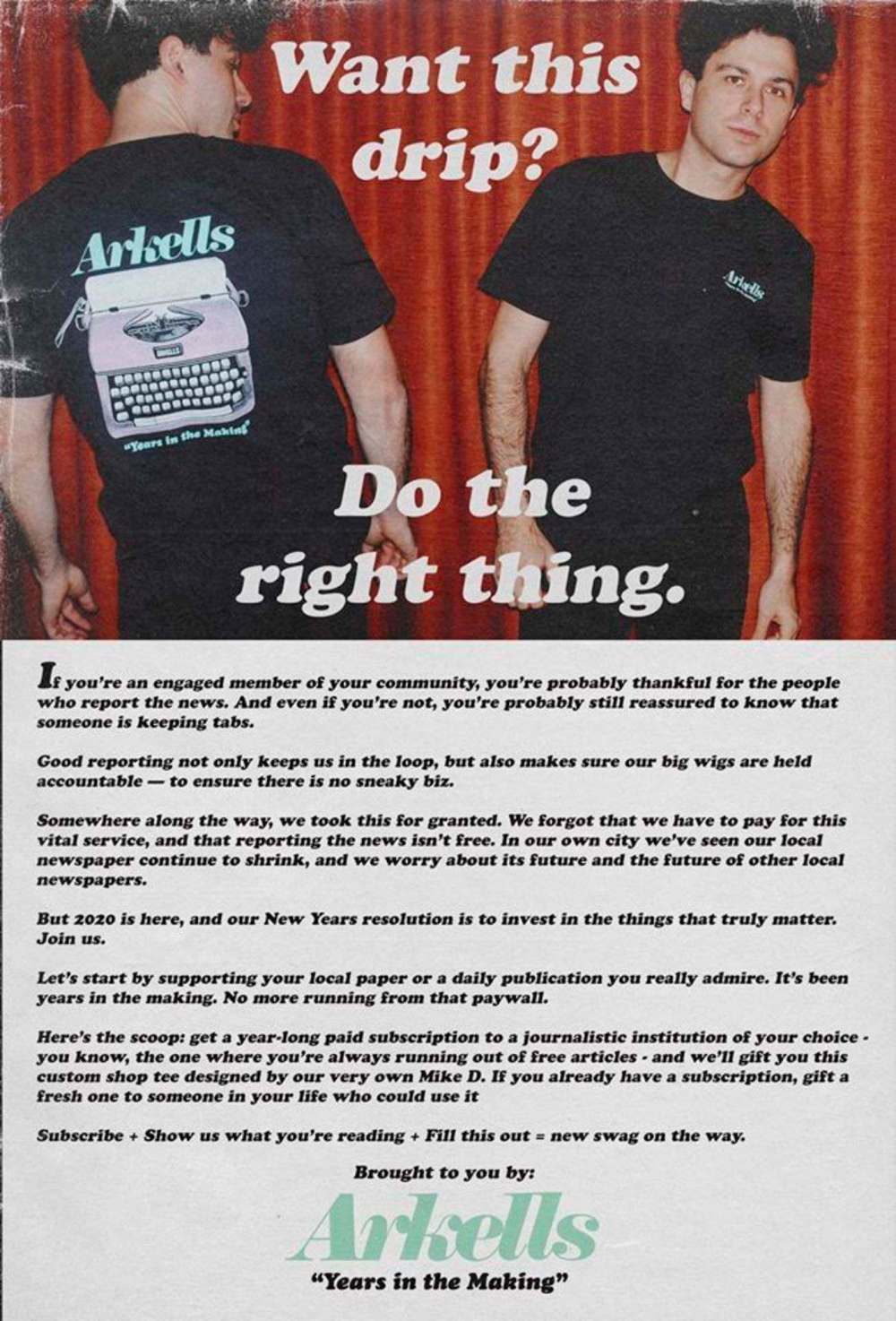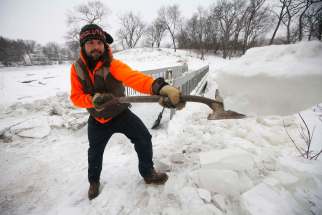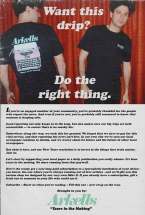Listen to the Arkells: newspapers vital
Read this article for free:
or
Already have an account? Log in here »
To continue reading, please subscribe:
Monthly Digital Subscription
$0 for the first 4 weeks*
- Enjoy unlimited reading on winnipegfreepress.com
- Read the E-Edition, our digital replica newspaper
- Access News Break, our award-winning app
- Play interactive puzzles
*No charge for 4 weeks then price increases to the regular rate of $19.00 plus GST every four weeks. Offer available to new and qualified returning subscribers only. Cancel any time.
Monthly Digital Subscription
$4.75/week*
- Enjoy unlimited reading on winnipegfreepress.com
- Read the E-Edition, our digital replica newspaper
- Access News Break, our award-winning app
- Play interactive puzzles
*Billed as $19 plus GST every four weeks. Cancel any time.
To continue reading, please subscribe:
Add Free Press access to your Brandon Sun subscription for only an additional
$1 for the first 4 weeks*
*Your next subscription payment will increase by $1.00 and you will be charged $16.99 plus GST for four weeks. After four weeks, your payment will increase to $23.99 plus GST every four weeks.
Read unlimited articles for free today:
or
Already have an account? Log in here »
Hey there, time traveller!
This article was published 05/02/2020 (2135 days ago), so information in it may no longer be current.
Who knew that a rock band from Hamilton would try to convince people to pay for local news?

The Arkells are encouraging their fans to "do the right thing" and purchase a year-long subscription to a journalistic outlet of their choosing, starting with their local paper or a publication on which they constantly hit their article limit. The Juno-winning band will then gift a custom T-shirt upon proof of new subscription. Already subscribe to something? Gift a subscription.
"Somewhere along the way, we took this for granted," the band posted on its website. "We forgot that we have to pay for this vital service, and that reporting the news isn’t free. In our own city we’ve seen our local newspaper continue to shrink, and we worry about its future and the future of other local newspapers. But 2020 is here, and our New Years resolution is to invest in the things that truly matter. Join us."
And the incentive is working, according to the Arkells, who tweeted they are already seeing hundreds of subscriptions roll in.
Amazing response so far. Seeing hundreds of new subscriptions rolling in❤️
Here’s a few: New York Times, The Standard, The Spec, Ottawa Citizen, Globe and Mail, The Athletic, Calgary Herald, The Toronto Star, London Free Press etc etc https://t.co/jTfKwR5040
— ARKELLS (@arkellsmusic) February 4, 2020
It’s not just heartwarming that the band would be such a champion of local news. It makes sense. After all, music and news are two things a lot of people think they should get for free, thanks to the Internet.
We have always had to pay for the newspaper, whether it was via subscription or buying a single copy from a corner store. Then the Internet arrived — and, contrary to what some publishers believed in the 1990s, ended up sticking around — and disrupted the publishing model, and newspapers "went digital" by simply putting their articles online. Then newspapers stopped being able to rely on classified ads thanks to the boom in online marketplaces. Revenues went down. Newspapers started to close. Blogs, once so threatening to legacy media, went through their own boom and bust. And now the layoffs and closures have come for the digital outlets, too.
The News Photographers
The Arkells aren’t the only Canadian band pledging their love of the news this week.
In 2017, children’s musician Raffi took strong exception to the slightly NSFW name of Vancouver indie rockers The New Pornographers.
The Arkells aren’t the only Canadian band pledging their love of the news this week.
In 2017, children’s musician Raffi took strong exception to the slightly NSFW name of Vancouver indie rockers The New Pornographers.
Raffi later took it back, but the criticism must have struck a chord because the band recently unveiled kids’ T-shirts, with their name retooled to be the more age-appropriate "The News Photographers." The youth T-shirts feature the cover artwork for their latest album, 2019’s In The Morse Code of Break Lights.
In music, the sales of physical albums was first hit by Napster in the early 2000s and then, later, by streaming and YouTube. People no longer had to pony up for a whole album to get the single; they could just find it online. Record stores closed, and artists had to spend way more time on the road to make a living.
If print media and music can be joined in a Venn diagram, then reporting on areas of life, arts, entertainment and cultural criticism — you know, the things that make people ask "is this news?" — sits in the centre.
The number of outlets that are still dedicating resources to arts coverage is vanishingly small. When I began my career in 2006, I was a music journalist who was able to make a decent living writing for alt-weeklies and freelancing for Canadian music publications (RIP Chart). By 2008, I was able to support myself, roommate free, in an Osborne Village apartment thanks to an already-rare staff writer position.

Most alt-weeklies — places where new writers could really cut their teeth in criticism, hone their voices, and offer perspectives not always included in the daily — have shuttered across Canada and the U.S., including New York City’s inimitable Village Voice. Legacy publications are scaling back their daily Arts & Life sections and eliminating dedicated beats, and all the expertise and source networks that comes with them. My own resume is a graveyard.
Clickbait came for the music magazines too, which is why every online music publication that’s left runs the same aggregated content, strung together by a freelance writer tasked with churning out eight to 10 articles per day for "exposure" or a minuscule flat rate per post. Everything has become "content." Fast, disposable, cheap.
Coming full circle, these changes impact workhorse Canadian touring bands such as, say, the Arkells, who rely on coverage from the local alt weekly or daily newspaper in the cities on their tour. Music journalism is about more than promotion. It’s about wayfinding. It’s experienced writers you can trust to cut through the noise and tell you what to listen to when there’s just too much to listen to, while providing the added value of storytelling, criticism, and cultural context.
When newspapers, including the Free Press, rolled out paywall and subscription models, some people bristled, because they were very used to getting it for free. But news, and everything else a newspaper offers, isn’t free. It costs money to produce– especially the kind that makes a newspaper worth subscribing to.
When newspapers, including the Free Press, rolled out paywall and subscription models, some people bristled, because they were very used to getting it for free. But news, and everything else a newspaper offers, isn’t free. It costs money to produce — especially the kind that makes a newspaper worth subscribing to. And even the news you think is free is not.
I’ve heard many of the arguments as to why news should be free, especially when I’m harrumphing about people cutting and pasting full articles onto Facebook. And, well, yeah. Of course free is better. And yes, there are barriers to access. But we pay for our needs and wants all the time, whether it’s our morning caffeine fix, or our Netflix subscription, or our cable, or our Internet connection.
Of course, newspapers can’t rely on the Arkells to drive subscriptions. Newspapers, through their reporting, need to be indispensable to their communities. To do that, their communities need to view them as indispensable.
jen.zoratti@freepress.mb.ca
Twitter: @JenZoratti

Jen Zoratti is a Winnipeg Free Press columnist and author of the newsletter, NEXT, a weekly look towards a post-pandemic future.
Our newsroom depends on a growing audience of readers to power our journalism. If you are not a paid reader, please consider becoming a subscriber.
Our newsroom depends on its audience of readers to power our journalism. Thank you for your support.
History
Updated on Wednesday, February 5, 2020 7:18 PM CST: Fixes typo

.jpg?w=1000)








